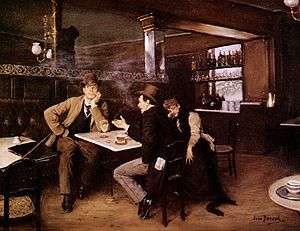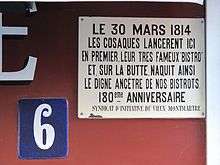Bistro
A bistro or bistrot /ˈbiːstroʊ/, is, in its original Parisian incarnation, a small restaurant, serving moderately priced simple meals in a modest setting with alcohol. Bistros are defined mostly by the foods they serve. French home-style cooking, and slow-cooked foods like cassoulet, a bean stew, are typical.[1]

History
Bistros likely developed out of the basement kitchens of Parisian apartments where tenants paid for both room and board. Landlords could supplement their income by opening their kitchen to the paying public. Menus were built around foods that were simple, could be prepared in quantity and would keep over time. Wine and coffee were also served.
Today, bistros are mostly still part of the hospitality industry. They are often connected with hotels, bars and pubs. They still often serve cheaper, simplified menus or menus that are not tied to a specific cultural cuisine.
Etymology

The etymology is unclear, and is presumed to come from a regional word: bistro, bistrot, bistingo, bistraud, bistouille or bistrouille. The first recorded use of the word appears in 1884.[2] A popular folk etymology of the word claims that it originated among Russian troops who occupied Paris following the Napoleonic Wars (from быстро, "quickly"), which was allegedly shouted by Russian officers or Cossacks who wanted to be served quickly. This etymology has been discredited by some French linguists, as there is no attestation to the occurrence of this word until the end of the 19th century.[3][4]
See also
- Brasserie, a slightly more formal French restaurant that may brew its own beer
- Parisian café, centers of French social and culinary life
- Sidewalk cafe
References
- Porcelli, Joey; Fong, Clay (2006), The Gyros Journey: Affordable Ethnic Eateries Along the Front Range, Fulcrum Publishing, p. 98, ISBN 978-1-55591-579-7
- Jacqueline Picoche, Dictionnaire etymologique du Français, Dictionnaires Le Robert, 1994, p. 51
- David L. Gold, Studies in Etymology and Etiology Universidad de Alicante, 2009, p. 19-47.
- Alain Rey, Dictionnaire historique de la langue française, Dictionnaires Le Robert, 1998, p. 408.
External links

- Merriam-Webster definition
- Paris Bistros: The Democratization of Excellence